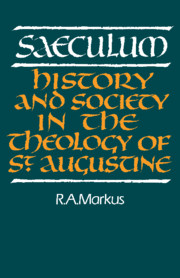Book contents
- Frontmatter
- Contents
- Introduction to the revised edition
- Preface
- Abbreviations
- 1 History: sacred and secular
- 2 Tempora Christiana: Augustine's historical experience
- 3 Civitas terrena: the secularisation of Roman history
- 4 Ordinata est res publica: the foundations of political authority
- 5 Afer scribens Afris: the Church in Augustine and the African tradition
- 6 Coge intrare: the Church and political power
- 7 Civitas peregrina: signposts
- Appendixes
- Bibliographical note
- List of works referred to
- Index
3 - Civitas terrena: the secularisation of Roman history
Published online by Cambridge University Press: 26 October 2009
- Frontmatter
- Contents
- Introduction to the revised edition
- Preface
- Abbreviations
- 1 History: sacred and secular
- 2 Tempora Christiana: Augustine's historical experience
- 3 Civitas terrena: the secularisation of Roman history
- 4 Ordinata est res publica: the foundations of political authority
- 5 Afer scribens Afris: the Church in Augustine and the African tradition
- 6 Coge intrare: the Church and political power
- 7 Civitas peregrina: signposts
- Appendixes
- Bibliographical note
- List of works referred to
- Index
Summary
The exploitation of dramatic contrasts has always been one of the favoured devices of rhetoric. Augustine shared a liking for it with his literary contemporaries. There was something about the cast of his mind, however, which made dramatic contrasts a more than normally apt means of expressing his ideas. The schemes in which he thought tended to organise themselves around two poles. The notion of the ‘two cities’ is only one of many paired conceptions at the foundations of his thought. The division of mankind into two categories is a theme which enters into Augustine's earliest reflection on the course of human history. In one of the earliest of his expositions of the six stages of history, Augustine divides the human race into two genera: ‘the crowd of the impious who bear the image of the earthly man’, and ‘the succession of men dedicated to the one God’. The duo genera hominum had a long and continuous history in his writings over the next quarter of a century.
In the course of the following decade the idea took more definite shape in his mind: the two ‘kinds’ of men were defined in terms of two communities they were said to belong to, and their opposition was stated in terms of the opposition of two ‘cities’, one of the impious, the other of the saints. By about 411, when he was writing the eleventh book of his great Commentary on Genesis, Augustine had formed the intention of devoting a work specifically to the ‘two cities’.
- Type
- Chapter
- Information
- SaeculumHistory and Society in the Theology of St Augustine, pp. 45 - 71Publisher: Cambridge University PressPrint publication year: 1989



